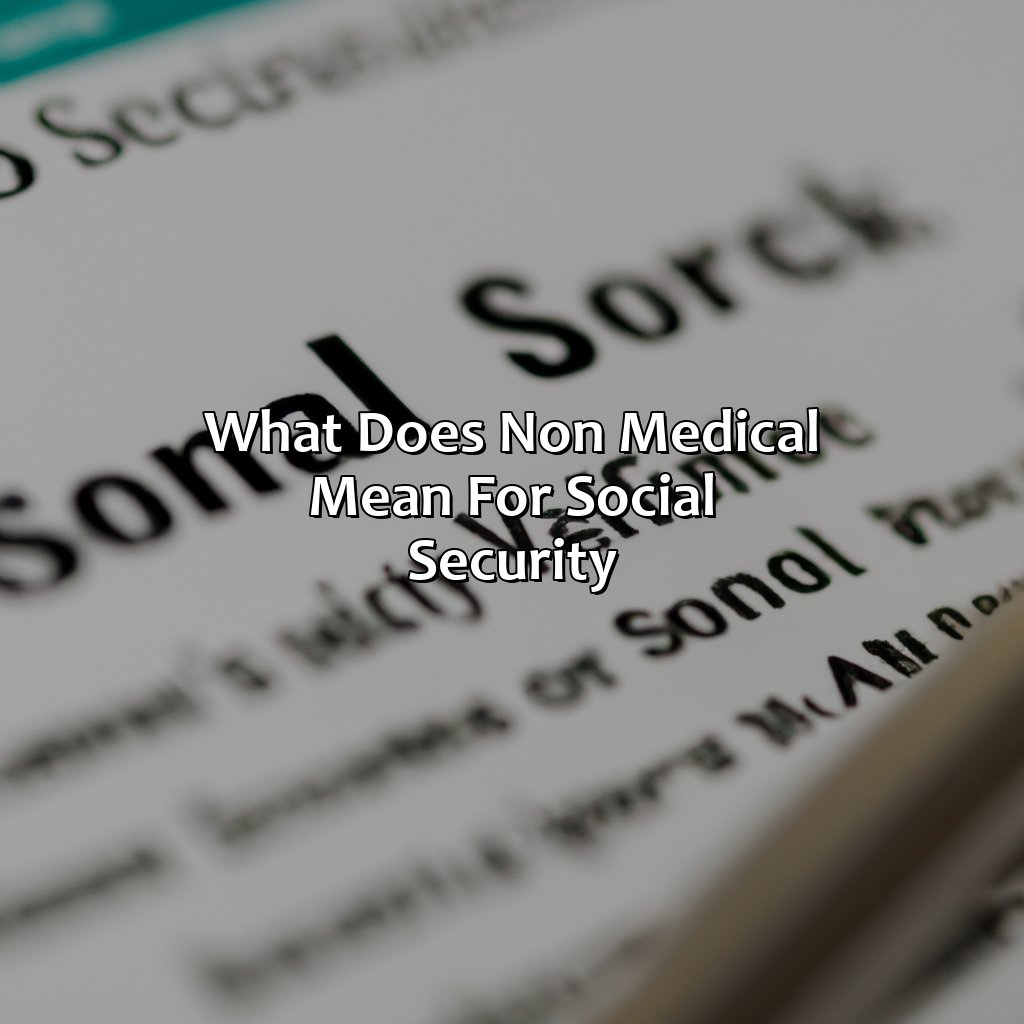What Does Non Medical Mean For Social Security?
Key Takeaway:
- Non-medical criteria for Social Security refers to the eligibility requirements based on factors other than medical condition, such as income, citizenship status, and employment status.
- Income and resources are some of the non-medical criteria considered by Social Security. The amount of income and resources can affect eligibility for certain programs and the amount of benefits received.
- Citizenship and alien status are also important non-medical criteria, as only U.S. citizens or certain eligible non-citizens are eligible for Social Security benefits.
- Employment status can also impact Social Security benefits, such as eligibility for disability benefits or retirement benefits based on years of work and contributions to the program.
- Understanding non-medical criteria is essential for determining eligibility for Social Security programs and benefits, and can help individuals make informed decisions about their financial future.
You are trying to figure out what Social Security Disability Insurance (SSDI) means for you and your family, and you’re wondering what “non-medical” means in this context. This article will provide you with an overview of SSDI and explain the non-medical criteria for qualifying for benefits.
Definition of non-medical criteria for Social Security
Non-medical criteria refer to the factors other than the medical condition that determine eligibility for Social Security benefits. These criteria include age, income, work history, and marital status.
When applying for Social Security benefits, medical and non-medical criteria are evaluated to determine if an individual is eligible for benefits. Medical criteria consider the physical or mental impairment of the individual, while non-medical criteria provide information about the individual’s life situation.
It is essential to meet both medical and non-medical criteria to receive Social Security benefits. Failure to qualify under either set of criteria means that the application could be denied.
In the past, non-medical criteria have been a subject of controversy, as some individuals with serious medical conditions may fail to qualify because they do not meet non-medical criteria. However, these criteria are necessary to prevent fraudulent applications and ensure that only those who genuinely need benefits receive them.
In summary, understanding non-medical criteria’s role in Social Security is crucial for individuals filing a benefit claim and government officials managing the system. It is necessary to realize that the criteria are designed to achieve fairness and support those most in need.

Image credits: retiregenz.com by Yuval Duncun
What is considered non-medical?
Non-medical refers to any expenses that are not directly related to a medical condition or treatment. This includes expenses for food, housing, clothing, transportation, and personal hygiene. Social Security uses this term when determining eligibility for Supplemental Security Income (SSI) benefits, which are based on income and resources. Non-medical expenses are considered in the calculation of a person’s countable income, which can affect their eligibility for SSI benefits. It is important for individuals to understand what expenses are considered non-medical when applying for SSI benefits to ensure they receive the maximum amount of benefits for which they are eligible.
Pro Tip: Keep accurate records of all non-medical expenses to ensure proper calculation of countable income for SSI eligibility.

Image credits: retiregenz.com by David Duncun
How non-medical criteria affects Social Security benefits
When it comes to Social Security benefits, non-medical criteria can play a crucial role. Factors such as income, age, and work history can all affect the amount of benefits an individual may receive. Additionally, eligibility for some benefits, such as Supplemental Security Income, may depend solely on non-medical factors. It is essential to understand the impact of these criteria and plan accordingly.
For example, if an individual has a high income or significant savings, they may receive reduced benefits or may not be eligible altogether. Similarly, if an individual starts claiming benefits before reaching full retirement age, their benefits may be reduced. Non-medical criteria can also affect eligibility for disability benefits. For instance, an individual must have a certain number of work credits to qualify for Social Security Disability Insurance.
It is crucial to note that non-medical criteria can change over time. Lawmakers may adjust the rules around eligibility and benefit amounts, potentially impacting your benefits. Understanding how non-medical criteria can affect your Social Security benefits and staying up-to-date on any changes is key to maximizing your benefits.
A significant historical example of this came in 1983 when lawmakers made changes to Social Security to address funding shortfalls. As part of these changes, the retirement age was gradually increased, affecting when individuals could claim full benefits. Understanding the impact of these changes and planning accordingly was crucial for those approaching retirement age at the time.

Image credits: retiregenz.com by Joel Arnold
Examples of non-medical criteria in Social Security
Non-Medical Criteria in Social Security Explained
Social Security benefits are not just awarded based on medical criteria, but also on non-medical factors that help assess a claimant’s eligibility. Here are some examples of these non-medical criteria:
- Earnings Record: The Social Security Administration considers a claimant’s earnings record to determine the amount of benefits they are eligible for. An individual’s work history and how much they paid into the Social Security system could affect the amount they receive.
- Age: The age at which a person retires affects their Social Security benefits. If a person retires at full retirement age or later, they are entitled to full benefits. If they retire before that, their benefits may be reduced.
- Marital Status: Social Security benefits may also depend on a claimant’s marital status. Individuals who are married or were previously married may be eligible for spousal or survivor benefits.
- Employment Status: If an individual is working, their earnings and income may affect the amount of Social Security benefits they receive. If claimed early, a portion of their benefits may be withheld if they earn more than a certain limit.
It’s important to keep in mind that these non-medical criteria may vary depending on the claimant’s unique circumstances. For example, some individuals may be eligible for disability and retirement benefits simultaneously, which could affect how much they receive.
To maximize your Social Security benefits, consider delaying claiming benefits until you reach full retirement age, if possible. Additionally, if you are still working, try to keep your earnings below the Social Security Administration’s limit to avoid having your benefits reduced. Knowing the various non-medical criteria can help you plan for a comfortable retirement.

Image credits: retiregenz.com by David Woodhock
Five Facts About What “Non-Medical” Means for Social Security:
“Non-medical” refers to income that is not related to disability or retirement benefits. (Source: Social Security Administration)
Non-medical income affects Supplemental Security Income (SSI) benefits, which are based on financial need. (Source: AARP)
Examples of non-medical income include wages, unemployment benefits, and investment income. (Source: Social Security Administration)
Non-medical income limits vary depending on the individual’s situation, including marital status and living arrangements. (Source: Social Security Administration)
Understanding non-medical income is important for individuals applying for or currently receiving SSI benefits. (Source: Disability Benefits Center)
FAQs about What Does Non Medical Mean For Social Security?
What does non medical mean for social security?
Non medical means that the Social Security Administration is not concerned with your medical condition when determining your eligibility for benefits.
What factors does Social Security consider that are non medical?
Social Security considers various non medical factors, such as age, income, work history and contributions to Social Security, when determining eligibility for benefits.
Do non medical factors affect the amount of Social Security benefits I receive?
Yes, non medical factors can affect the amount of benefits received. For example, the longer you work and contribute to Social Security, the higher your benefits will be.
Does non medical eligibility mean I don’t need to provide medical documentation?
No, medical documentation may still be required to support your claim for benefits, even though non medical factors are considered.
What are some examples of non medical benefits provided by Social Security?
Some examples of non medical benefits provided by Social Security include retirement benefits, survivor benefits, and disability benefits.
Can I appeal if I disagree with the non medical decision made by Social Security?
Yes, you can appeal a decision made by Social Security if you disagree with it. You have the right to request a reconsideration, hearing, and review by the Appeals Council.
 Checkout this IRS Loophole
Checkout this IRS Loophole 
